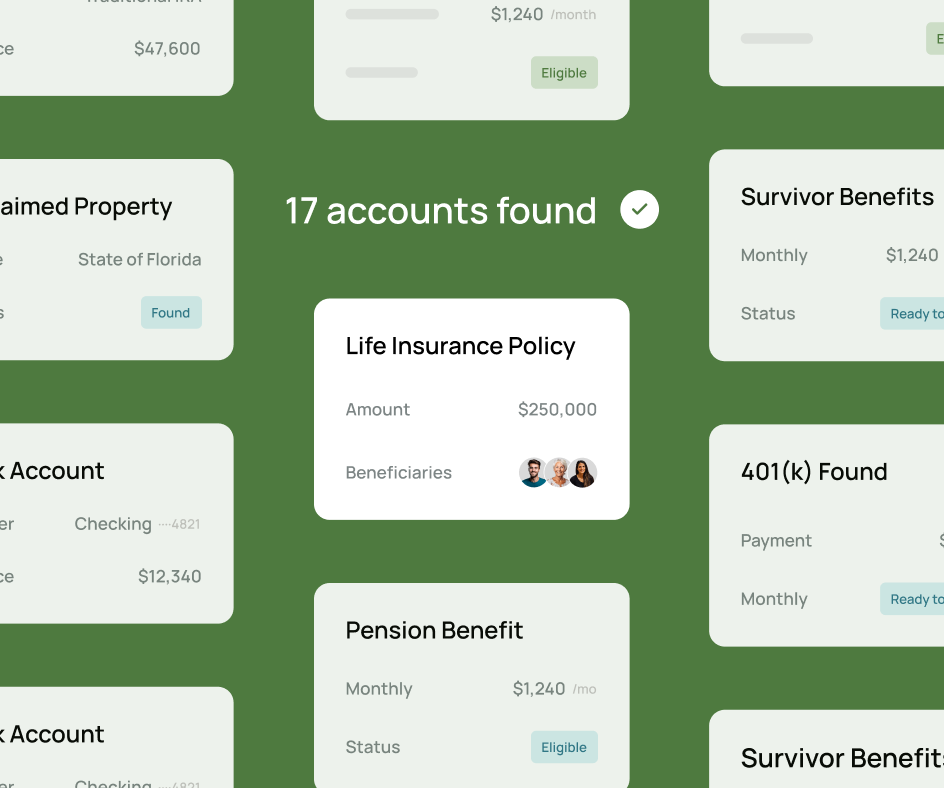Key Takeaways
- Beneficiaries are not required to accept a timeshare and can legally decline it through a disclaimer of interest.
- Ongoing fees such as maintenance dues and assessments continue after death and must be paid by the estate until the timeshare is transferred or disclaimed.
- Some resorts offer deed-back or exit programs that allow estates to return unwanted timeshares, while others may foreclose if payments stop.
{{blog-cta-financial}}
If you or someone in your family owns a timeshare, you may be unsure about what happens to it after the owner dies. Timeshares often carry ongoing fees and legal obligations, and those responsibilities do not automatically end after a death. If you have authority to act, this guide explains what typically happens to a timeshare, whether beneficiaries have to accept it, and how to plan ahead to protect your family from unexpected challenges.
What Happens to a Timeshare When the Owner Dies?
A timeshare is a form of property ownership—either real estate (in the case of a deeded timeshare) or a contractual right to use the property for a certain number of weeks per year. Because of that, a timeshare doesn’t end automatically upon death.
When the owner of a deeded timeshare dies, that property interest usually passes to beneficiaries through probate, just like a house or any other asset. If there’s a will, the executor will determine who inherits it. If there’s no will, the timeshare passes according to state intestacy laws, which decide how assets are distributed when someone dies without a will.
It’s important to note that even though a timeshare can have sentimental value, it also carries ongoing maintenance fees and assessments. These costs continue after the owner’s death and must be paid by the estate until the property is transferred or disclaimed.
What Happens to My Parents’ Timeshare When They Die?
If your parents owned a timeshare, you might wonder whether it automatically becomes your responsibility. The answer is: not unless you want it.
A timeshare can be inherited if it’s part of your parents’ estate, but beneficiaries are not legally required to accept ownership. Before the estate is closed, any timeshare fees after death—like maintenance dues or special assessments—can be paid from estate funds if there are enough assets available.
However, if you don’t want the timeshare, you can decline it. This process, called a disclaimer of interest, means you refuse the inheritance and the timeshare is returned to the estate. The executor can then try to sell it, transfer it back to the resort (if the resort offers a “deed-back” program), or allow it to go into foreclosure.
If you’re facing this situation, it’s best to talk to the estate’s attorney before making a decision, especially if the timeshare has significant ongoing fees or low resale value.
Do Timeshares End When You Die?
One common misconception is that a timeshare simply ends when its owner passes away.
Deeded timeshares are perpetual real estate interests, meaning they continue indefinitely until transferred or foreclosed. Ownership can pass to beneficiaries for generations unless someone takes steps to legally transfer or disclaim it.
However, some timeshare contracts—known as “right-to-use” timeshares—operate differently. These agreements often grant usage rights for a specific term (for example, 30 or 50 years). In some cases, those contracts may expire upon the owner’s death or at the end of the term, making them simpler to manage from an estate perspective.
If you’re unsure which type of timeshare you have, review your ownership documents or contact the resort’s management company.
What If I Don’t Want the Timeshare?
- File a Disclaimer of Interest. Within a certain timeframe after the owner’s death (usually nine months), you can formally refuse the inheritance. This means the timeshare won’t transfer to your name, and you won’t be responsible for fees.
- Ask About Deed-Back or Exit Programs. Some resorts have programs allowing owners or estates to return unwanted timeshares, sometimes for a fee.
- Let the Timeshare Go Into Foreclosure. If the estate or beneficiaries don’t make payments, the timeshare company can foreclose on the property. While this can affect the estate’s credit, beneficiaries' personal credit is typically unaffected if they’ve disclaimed the inheritance.
Planning ahead is the best way to prevent complications. Timeshare owners can work with estate planners to remove the property from their estate, transfer it during their lifetime, or set clear instructions for what should happen after death.
What Happens If I Stop Paying for My Timeshare?
Whether the owner is alive or deceased, stopping payments on a timeshare has consequences. If payments aren’t made, the resort or management company may:
- Charge late fees or interest.
- Send the account to collections.
- Begin foreclosure proceedings.
For living owners, this can negatively impact credit scores. After death, the responsibility for unpaid timeshare fees typically falls to the estate, not to the beneficiaries personally. However, if the estate lacks sufficient assets to pay, the timeshare company may eventually foreclose and reclaim the property.
Conclusion
Understanding what happens to your timeshare when you die is essential for estate planning. Without a clear plan, it could burden your family with costs and obligations they didn’t expect. Whether you own a deeded timeshare or a right-to-use contract, knowing your rights—and your beneficiaries’ options—can help avoid unexpected issues.
If you’d like to simplify the process of handling timeshares and other estate assets, visit Elayne’s Automated Estate Settlements platform to explore how technology can make estate management simpler.
{{blog-cta-financial}}
FAQs
Q: Am I responsible for my parents’ timeshare when they die?
No. You’re not legally required to accept a timeshare inheritance. You can disclaim your interest, and the estate will handle it.
Q: Can I be forced to inherit a timeshare?
No one can force you to take ownership. However, the estate may still need to deal with fees and foreclosure if no one claims it.
Q: Does a timeshare expire if you die?
Deeded timeshares generally do not expire. Right-to-use timeshares may end when the contract term ends or upon death, depending on the agreement.
Q: What is the downside of owning a timeshare?
The biggest downside is ongoing costs—maintenance fees, taxes, and assessments—that can continue indefinitely and may increase over time.
*Disclaimer: This article is for informational purposes only and does not provide legal, medical, financial, or tax advice. Please consult with a licensed professional to address your specific situation.












































